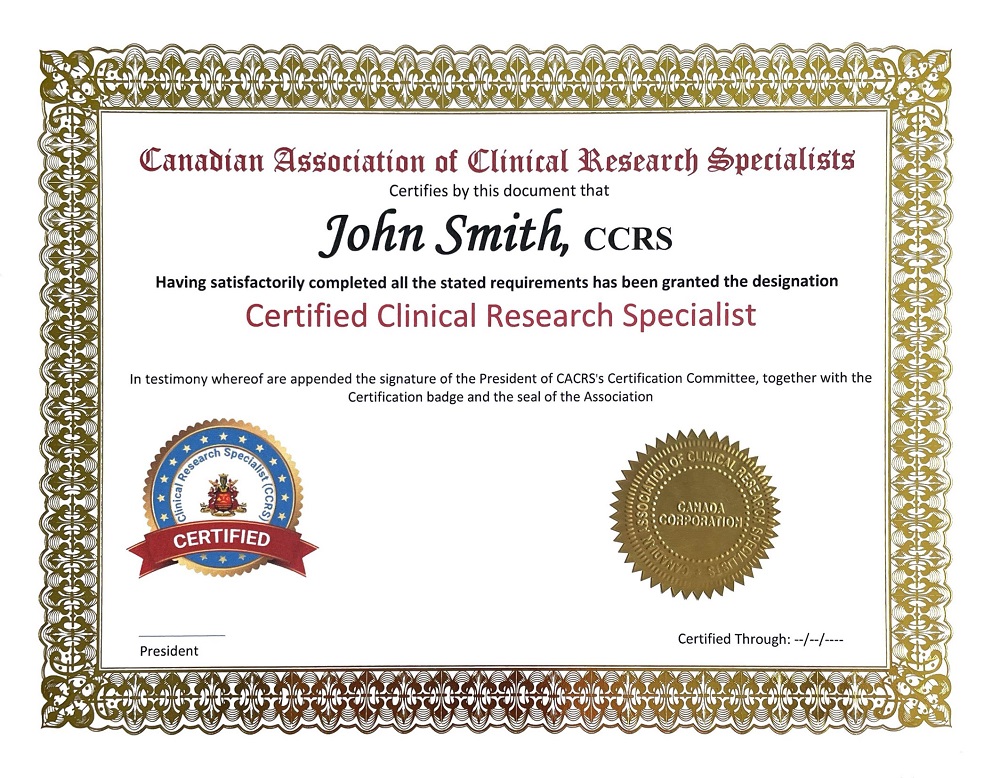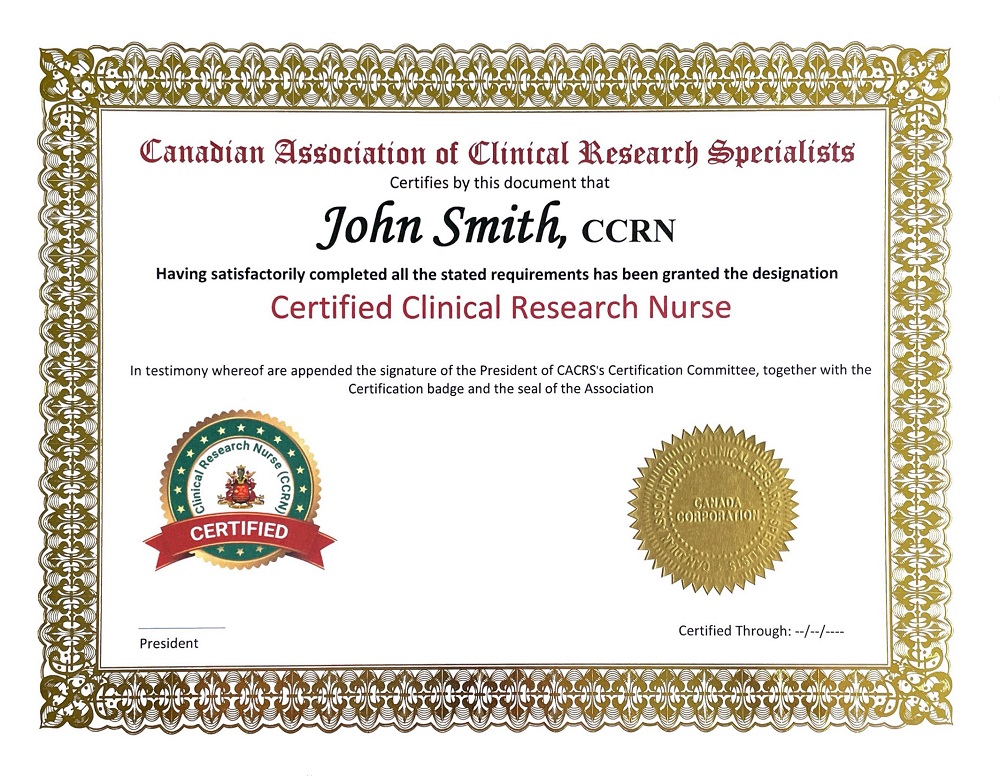Certifications
Certified Clinical Research Specialist (CCRS) Certification
Value of the CCRS Certification
The Certified Clinical Research Specialist CCRS demonstrates to employers, clients, and colleagues that a clinical research specialist has the essential knowledge, monitoring skills, critical thinking abilities and commitment to advancing professional knowledge and abilities. As the demand for competent clinical research specialists increases globally, CRS certification credentialed professionals are well positioned to be effective team members and contributors in every work setting. Recognition of the CRS certification continues to grow around the world and CRS credentialed professionals earn higher salaries than those who do not hold the credential. The CRS certification program which leads to the award of CCRS Certified Clinical Research Specialist helps new or seasoned Clinical Research Monitors to demonstrate their professional excellence through a validated certification process. CRS certification also provides personal satisfaction and increased recognitions by peers, managers, and the industry at large.

About Certification
The primary purpose of any professional certification program is to provide an independent assessment of the knowledge, skills and/or competencies required for competent performance of a professional role. This assessment is typically accomplished by the successful completion of an examination.
Eligibility Requirements
- Bachelor’s degree or higher, 2500 working hours and detailed resume/CV.
- Associate degree or LPN, LVN, 3500 minimum working hours and detailed resume/CV
- Lab Technician, Medical Assistant, 5000 minimum working hours and detailed Resume/CV
Approved Canadian program providers so far:
McMaster University, Humber College, Sheridan College, CACRS
Non-discrimination Policy
The CCRS certification program does not discriminate among candidates because of age, gender, race, religion, national origin, disability, sexual orientation, or marital status.
Preparing for the examination
The CRS certification examinations are not very challenging however it is important to develop a study plan to prepare for the examination. Your plan should be based on your training, knowledge, experience, and preferred approach to learning. Here are some things to consider:
Review the examination content outline shown in the restricted members area. The examination content outline contains the content domains, competency statements and approximate number of questions in each domain. Examination questions are based on the most recent guidelines and regulations of Canada, US and EU.
Computer-Based Exam and Testing Window
The CRS examinations are computer-based and can be taken at the comfort of your office or home. The exam consists of 125 multiple-choice questions, answered in a two-hour time limit, and should be completed in one sitting. Questions will be randomly selected from CACRS questions pool to make each exam unique.
After registering for the exam and paying the examination fees to CACRS, a login access to the exam will be created and emailed to the candidate highlighting the testing window period for the candidate. Each testing window is a two-month period.
Registering for Clinical Research Specialist Certification Exam:
Candidates send their certification exam request with their resume/CV attachment to certification@cacrs.com highlighting the name of certification in the subject line. The certification committee will answer back in 5 business days by return email whether the candidate is eligible or not. If eligible, candidate will access a web-based registration form enabling him/her to register and pay the examination fees.
Please note that payments are not refundable.
Examination Fees
- CACRS Member $160 (Canadian Dollars Fund)
- CACRS Non-members $530 (Canadian Dollars Fund)
The CACRS member rate applies only if you are a member at the time, you submit your certification request. Please be sure you receive confirmation of your CACRS membership before you submit your CRS certification request.
Get information about CACRS membership online at CACRS.com/become a member.
Examination Security and Confidentiality
The CRS certification examinations are the sole and exclusive property of the CRS program. These materials are confidential and not available for review by any person or organization other than the CACRS Board and the examination committees. Copying, publishing, or disclosing examination content in any form is considered a violation of the CRS certification Security and Confidentiality policy and will be subjected to disciplinary action which may include termination of a testing session, invalidation of test results and/or revocation of CRS credential.
Examination Scoring
The exam consists of 125 multiple-choice questions to measure the knowledge and competencies and each question has only one correct answer and should be completed in one sitting. The time allotted for the exam is 2 hours. Each question is equally rated with 1 point. The passing score is 80% and above. CACRS Learning Management System track and report the results and the names of candidates who passed or failed with their score.
The system also shows the difficulty levels of the questions which help CACRS Board to update the question’s bank at the end of each year.
Notification of Examination Results
Examination results are typically available one week after completing the exam. You will receive an email notification with your pass or fail results. Approximately 7-10 days following the exam completion, you will receive a confirmation of your score as well. Results are released only to candidates. No results will be reported over the telephone or by fax.
Use of the CRS Designation
When you pass a CRS examination you may use the CRS designation after your name as a professional credential. You should list your CRS credentials after earning as CCRS (Certified Clinical Research Specialist) on your resume, curriculum vitae, employment, or other professional records. The CRS designation cannot be used by individuals who fail to maintain the CRS credential by meeting recertification requirements. The designation is valid for 3 years.
Retaking the Examination
Candidates who do not pass the CRS examination are eligible to retake the examination. To apply for re-examination, candidates must submit a new certification request. There is no limit on the number of times a candidate can take an examination. Candidates can retake the exam not before 4 weeks from the previous exam. Full registration fees should be paid for rewriting the exam.
Release of Information
The CRS program maintains strict procedures for ensuring the confidentiality of all candidate records. Information about candidates is released only to the candidates themselves. Scores are only released to the candidate through his/her email and are not released by telephone or fax even to the candidate.
CRS DETAILED EXAMINATION CONTENT OUTLINE
The CRS examination is organized into five major domains, with associated tasks and responsibilities typically undertaken by a Clinical Research Professional. The approximate distribution of types of questions for each domain and outlines are shown in the restricted portal/area for CACRS members.
- Domain I: Ethical Principles / Informed Consent/ Safety
- Domain II: Institutional Review Board/ Independent Ethics Committee/Research Ethics Board {IRB/IEC/REB) Roles and Responsibilities.
- Domain III: Clinical Trial Protocol and Protocol Amendments
- Domain IV: Investigator’s Roles and Responsibilities
- Domain V: Sponsor’s Roles and Responsibilities
RECERTIFY
Maintaining Your CRS Credential
Continual learning, knowledge enhancement and professional development are vital to Clinical Research Specialists. Once certified, you maintain your CRS through continued learning and involvement in professional activities. You are required to renew your CRS certification every three years by earning 24 recertification credits. Credits may be accumulated in many ways, including participation in continuing education, public speaking on clinical research topics, professional writing, blogging and involvement with professional organizations.
Recertification Fees:
- CACRS Member $160 (Canadian Dollars Fund)
- CACRS Non-members $530 (Canadian Dollars Fund)
Certified Clinical Research Nurse (CCRN) Certification
Value of the CCRN Certification
The Certified Clinical Research Nurse CCRN demonstrates to employers, clients, and colleagues that a clinical research Nurse has the essential knowledge, clinical research coordinating skills, critical thinking abilities and commitment to advancing professional knowledge and abilities. As the demand for competent clinical research Nurses increases globally, CRN certification credentialed professionals are well positioned to be effective team members and contributors in every work setting. Recognition of the CRN certification continues to grow around the world and CRN credentialed professionals earn higher salaries than those who do not hold the credential. The CRN certification program which leads to the award of CCRN Certified Clinical Research Nurse helps new or seasoned Clinical Research Nurses to demonstrate their professional excellence through a validated certification process. CRN certification also provides personal satisfaction and increased recognitions by peers, managers, and the industry at large.

About Certification
The primary purpose of any professional certification program is to provide an independent assessment of the knowledge, skills and/or competencies required for competent performance of a professional role. This assessment is typically accomplished by the successful completion of an examination.
Eligibility Requirements
To be eligible for the CRN examination you need to meet one of the following educational and professional experience requirement combinations:
- Bachelor’s degree or higher in nursing, 2500 working hours and detailed resume/CV.
- Associate degree or LPN, LVN, 3500 minimum working hours and detailed resume/CV
*If an applicant obtained a clinical research degree program or a clinical research certificate/diploma program, 2000 hours may be waived from working experience. A certificate of completion must also be submitted including name of school/training program provider, program title and date attended.
Approved Canadian program providers so far:
McMaster University, Humber College, Sheridan College, CACRS
Non-discrimination Policy
Preparing for the examination
The CRN certification examinations are not very challenging however it is important to develop a study plan to prepare for the examination. Your plan should be based on your training, knowledge, experience, and preferred approach to learning. Here are some things to consider:
Review the examination content outline shown in the restricted members area. The examination content outline contains the content domains, competency statements and approximate number of questions in each domain. Examination questions are based on the most recent guidelines and regulations of Canada, US, and EU.
Computer-Based Exam and Testing Window
The CRN examinations are computer-based and can be taken at the comfort of your office or home. The exam consists of 125 multiple-choice questions, answered in a two-hour time limit, and should be completed in one sitting. Questions will be randomly selected from CACRS questions pool to make each exam unique.
After registering for the exam and paying the examination fees to CACRS, a login access to the exam will be created and emailed to the candidate highlighting the testing window period for the candidate. Each testing window is a two-month period.
Registering for Clinical Research Nurse Certification Exam:
Candidates send their certification exam request with their resume/CV attachment to certification@cacrs.com highlighting the name of certification in the subject line. The certification committee will answer back in 5 business days by return email whether the candidate is eligible or not. If eligible, candidate will access a web-based registration form enabling him/her to register and pay the examination fees.
Please note that payments are not refundable.
Examination Fees
- CACRS Member $160 (Canadian Dollars Fund)
- CACRS Non-members $530 (Canadian Dollars Fund)
The CACRS member rate applies only if you are a member at the time, you submit your certification request. Please be sure you receive confirmation of your CACRS membership before you submit your CRN certification request.
Get information about CACRS membership online at CACRS.com/become a member.
Examination Security and Confidentiality
The CRN certification examinations are the sole and exclusive property of the CRN program. These materials are confidential and not available for review by any person or organization other than the CACRS Board and the examination committees. Copying, publishing, or disclosing examination content in any form is considered a violation of the CRN certification Security and Confidentiality policy and will be subjected to disciplinary action which may include termination of a testing session, invalidation of test results and/or revocation of CRN credential.
Examination Scoring
The exam consists of 125 multiple-choice questions to measure the knowledge and competencies and each question has only one correct answer and should be completed in one sitting. The time allotted for the exam is 2 hours. Each question is equally rated with 1 point. The passing score is 80% and above. CACRS Learning Management System track and report the results and the names of candidates who passed or failed with their score.
The system also shows the difficulty levels of the questions which help CACRS Board to update the question’s bank at the end of each year.
Notification of Examination Results
Examination results are typically available one week after completing the exam. You will receive an email notification with your pass or fail results. Approximately 7-10 days following the exam completion, you will receive a confirmation of your score as well. Results are released only to candidates. No results will be reported over the telephone or by fax.
Use of the CRN Designation
When you pass a CRN examination you may use the CRN designation after your name as a professional credential. You should list your CRN credentials after earning as CCRN (Certified Clinical Research Nurse) on your resume, curriculum vitae, employment, or other professional records. The CRN designation cannot be used by individuals who fail to maintain the CRN credential by meeting recertification requirements. The designation is valid for 3 years.
Retaking the Examination
Candidates who do not pass the CRN examination are eligible to retake the examination. To apply for re-examination, candidates must submit a new certification request. There is no limit on the number of times a candidate can take an examination. Candidates can retake the exam not before 4 weeks from the previous exam. Full registration fees should be paid for rewriting the exam.
Release of Information
The CRN program maintains strict procedures for ensuring the confidentiality of all candidate records. Information about candidates is released only to the candidates themselves. Scores are only released to the candidate through his/her email and are not released by telephone or fax even to the candidate.
CRS DETAILED EXAMINATION CONTENT OUTLINE
The CRN examination is organized into five major domains, with associated tasks and responsibilities typically undertaken by a Clinical Research Professional. The approximate distribution of types of questions for each domain and outlines are shown in the restricted portal/area for CACRS members.
- Domain I: Ethical Principles / Informed Consent/ Safety
- Domain II: Institutional Review Board/ Independent Ethics Committee/Research Ethics Board (IRB/IEC/REB) Roles and Responsibilities.
- Domain III: Clinical Trial Protocol and Protocol Amendments
- Domain IV: Investigator’s Roles and Responsibilities
- Domain V: Sponsor’s Roles and Responsibilities
RECERTIFY
Maintaining Your CRN Credential
Continual learning, knowledge enhancement and professional development are vital to Clinical Research Nurses. Once certified, you maintain your CRN through continued learning and involvement in professional activities. You are required to renew your CRN certification every three years by earning 24 recertification credits. Credits may be accumulated in many ways, including participation in continuing education, public speaking on clinical research topics, professional writing, blogging and involvement with professional organizations.
Recertification Fees:
- CACRS Member $160 (Canadian Dollars Fund)
- CACRS Non-members $530 (Canadian Dollars Fund)
Subsribe To Our Newsletter
Stay in touch with us to get latest news and special offers.
